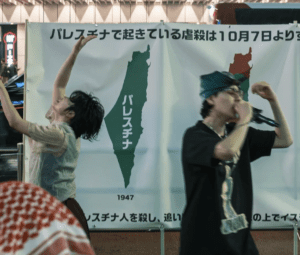At just 19 years old, Danny Jin, a Japanese-Palestinian rapper, is making a significant impact with his music by championing Palestinian rights. Born and raised in Tokyo, Jin is the grandson of a Nakba survivor, and he carries the weight of his Palestinian heritage into every verse he writes. His powerful lyrics address the ongoing struggles of Palestinians and criticize the political alliances and media narratives that contribute to the silence surrounding their plight, especially in Japan.
The Power of Music for Protest
Danny Jin’s music is a form of activism. His song “Boycott” is a direct critique of Japan’s political connections with Israel and calls out global corporations that support the occupation of Palestine. Jin explains the challenges of engaging with protest culture in Japan, where public demonstrations are less common. In an interview with AJ+, Jin shared, “I went to a protest and met a producer who gave me a beat. I was like, ‘let’s talk about boycotts.’ It’s simple. A boycott is accessible. In Japan, protest culture doesn’t exist the way it does elsewhere, so it’s a harder task to take to the streets. But if the sound is good, people will listen—and then they’ll start paying attention to the lyrics.”
In “Boycott,” Jin critiques various companies for their complicity in the occupation of Palestine. His lyrics serve as a rallying cry for resistance and collective action against oppressive systems:
Lyrics from “Boycott” (English)
“Starbucks Mcdonald and Kiyoto Tsuji Boycott Sumisho Aero Kawasaki Heavy Industries Boycott Papa Johns,Domino’s Pizza Hut Boycott Nsa, Fanuc and Elbit Boycott Puma ,zara and Wal-Mart Boycott Subway Kentucky Kit Kat Boycott Coca-Cola and Sprite Boycott Companies complicit in israel genocide Fxxk you Biden and fxxk all who support them
We say don’t kill but you guys all deny it. We desire peace so we are all United. So we Boycott Israel , Imperial United States Indulging in selfish desires, contributing to massacres. They kept insisting we are a peaceful nation. Feeling left out, merely watching from the sidelines. World peace is impossible if you just brush it off, pretending you didn’t know. Someone’s money turns into bullets that kill. Gatherings surrounded by products stained with blood.”
The chorus underscores his message of resistance and challenges listeners to confront political silence in the face of human rights abuses.
Raising Awareness in Japan

Despite Japan’s historical assistance to Palestinians, public awareness of the Palestinian struggle is limited. Jin highlights that many Japanese people are disconnected from both their own political landscape and the realities of the Palestinian occupation. “The majority of Japanese people don’t even engage with their own political landscape, let alone Palestine’s,” Jin explains. He hopes his music will serve as a gateway for Japanese audiences to better understand and engage with the Palestinian cause.
The Free Palestine movement is slowly gaining traction in Japan, with grassroots efforts like the Tears for Palestine protest organized by Palestinians in Japan (POF). Jin is optimistic that his music can bolster these efforts and reach people who might otherwise remain disengaged.
A Personal Connection to the Cause
Jin’s commitment to the Palestinian cause is deeply personal. His grandparents were among the 750,000 Palestinians displaced by Zionist militias during the Nakba in 1948. This historical trauma, passed down through generations, profoundly shapes Jin’s identity and drives his activism.
“I’m half Palestinian, half Japanese. My father is Palestinian. My grandparents were made refugees by the Nakba. After that, we became part of the Palestinian diaspora,” Jin shares. “I was born and raised in Japan, but I’ll never feel fully Japanese. Even as a child, I always felt tied to Palestine.”
Jin’s lyrics reflect this deep connection to his heritage. In his song “Peace,” he expresses a universal longing for a world free from violence and division:
Lyrics from “Peace”
Using Music for Change
Despite his youth, Danny Jin is making a notable impact through his music and activism. His songs not only reflect his frustration with global politics but also embody his hope for a peaceful world. Fans have already shared how Jin’s music has inspired them to participate in protests in support of Palestine.
Jin’s journey as a Japanese-Palestinian rapper demonstrates how art can be a powerful tool for social change. By blending his passion for music with his dedication to human rights, Jin is giving voice to the voiceless and challenging the world to break the silence surrounding Palestine. His music proves that hip-hop can unite people, ignite change, and drive conversations about justice. With each track, Jin continues to shape the discourse around Palestine and encourage listeners to stand up for what is right.
Follow Danny Jin:
twitter @dannyjin
Listen to his songs at: musixmatch
Relates stories:
10 Books to Read About Palestine
Japan Weighs Palestinian Statehood Recognition
McDonald’s Malaysia Sues BDS Movement for $1 Million in Damages Over Israel Boycott Campaign
Indonesians Unite in Boycott Against McDonald’s and Starbucks Over Alleged Support for Israel
















